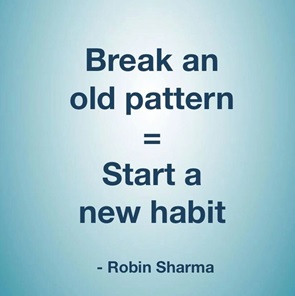Many hours of airtime and column inches of print and social media have been dedicated recently to the changes we all need to make to halt harmful climate change after decades of bad habits led us to the current crisis.
But whatever has been agreed by world leaders, nobody claims it’s going to be easy to reverse.
Because, as anyone who has ever tried to kick a bad habit knows, they are incredibly hard to break, whatever walk of life is under scrutiny.
Turning to other aspects of our lives how often do you check in with yourself – and those around you – to see whether some of those things that come so naturally to you, some of those unconscious actions or inactions, are actually good for you and your cause?


If you take a step back from your daily routine and break down decisions or actions into those that keep you ‘on course’ towards your desired goal and those that take you ‘off course’ from your chosen route, you can begin to identify those bad, unhelpful habits that have crept into your life.
Rarely do we make a conscious decision to create a bad habit, they come from actions that are repeated frequently until they become an unconscious behaviour.
These behaviours then become automatic, requiring little attention or effort.
And the science behind it is simple – the human brain looks for ways to save energy, hence habits form quickly, for good or ill.
We are what we repeatedly do. Excellence, then, is not an act, but a habit.
If only it were so simple to break them. Scientists tell us the best way to banish a bad habit is to replace it with a good one – yet it takes an average of 66 days for a good habit to become automatic. No wonder many of us fall off the wagon and persist with the easy to indulge negative behaviour.
And we’re not just talking bad physical habits such as smoking or taking drugs. Such habits can relate to our communication style, time management, self-care, negative self-talk…the list goes on.

So where to start? First things first – identify what the habit is that’s holding you back (checking in):
- Be open to engage with others about how they perceive you and establish the triggers that cause you to indulge in that negative behaviour while recognising the needs that habit is meeting.
- Keep a record – an old fashioned notebook and pen are the only tools you need for this and will help train your brain to focus on change.
Then comes the harder (but not impossible) part – finding a positive habit that fulfils the same need.
And the good news? By introducing one healthy habit into your life, there will be a knock-on effect to wider areas of your life, reducing other bad habits as your focus shifts to a conscious creation of positive behaviours.
But while 21st century scientists help us get to grips with the psychology behind habit forming and cracking, we’d all actually do well to turn the clock back more than 2,300 years for the best advice.
In his ultimate wisdom the great philosopher Aristotle proclaimed: ‘We are what we repeatedly do. Excellence, then, is not an act, but a habit.’
Keep up the good work and keep steering that course you’ve chosen – don’t allow yourself to be hijacked or veer off course.

